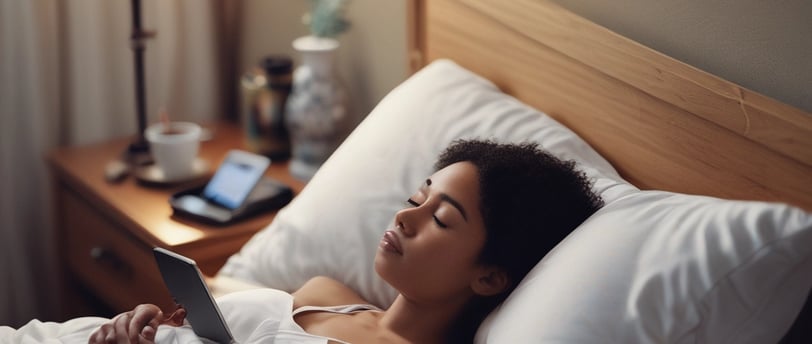Are Sleep and Productivity Apps Worth It? A Realistic Guide for Remote Workers
Discover the real impact of sleep and productivity apps for remote professionals. Learn which tools are genuinely helpful, explore practical strategies for work-life balance, and find expert-backed advice for better sleep and focus when working from home.
Anna Ai
7/18/20253 min read


Let’s be honest: working from home has its perks—pyjama days, toast for lunch, maybe the cat on your lap. But when your workday blends into your bedtime, finding the right balance between productivity and decent sleep can feel like a juggling act with too many balls in the air. Enter the world of productivity and sleep apps. Are they actually useful for remote professionals—or just another digital distraction?
The Rise of Sleep and Productivity Apps
Over the past few years—and especially since remote work became the new normal—the number of apps promising to boost your focus or help you drift off has exploded. Some track your sleep cycles, others block distracting websites, and a few try to do it all. The question is, are these digital helpers actually making any difference?
What Makes an App Worth Downloading?
Here’s the thing: not every app suits every person. Some remote workers thrive with a simple Pomodoro timer, whilst others prefer robust tools that analyse everything from caffeine intake to blue light exposure. If you’re thinking about trying an app, look for:
Clarity and Simplicity: Does the app do what it claims without overwhelming you with bells and whistles?
Reliable Data: An app that simply counts how many hours you’re in bed isn’t as useful as one that monitors your actual sleep cycles.
Customisation: Can you tweak the settings to match your work style and sleep patterns?
Privacy: Ensure your app is GDPR-compliant and transparent about how your data is used.
Popular Apps and How They Measure Up
A few apps consistently get good reviews from both experts and everyday users:
Sleep Cycle: Analyses your sleep using your phone’s sensors and wakes you up at your lightest sleep stage. Studies show that natural waking at the right part of your sleep cycle can ease grogginess and improve daytime focus1.
Headspace or Calm: Guided meditations and sleep stories claim to improve relaxation and reduce anxiety. The NHS suggests mindfulness and regular wind-down routines genuinely help with insomnia and anxiety around sleep2.
Forest: For productivity, it uses a simple principle—stay off your phone, grow a virtual tree. Research indicates brief, focused work intervals (such as those promoted by Pomodoro-style apps) can boost efficiency and reduce burnout3.
Noisli or myNoise: These apps offer customisable ambient sounds to mask distractions. There’s real science behind the calming effects of background noise on both focus and falling asleep—but again, personal preference is key.
What to Watch Out For
Download-happy? Pause for a second. Too many notifications or rigidly tracking every move can actually make you more anxious, not less. There’s even a name for it: “orthosomnia”, the quest for perfect sleep driven by data from sleep trackers. Like anything, moderation is key.
Practical Tips for Using Digital Tools
Set boundaries: Only use productivity apps during work hours, and set nightly “do not disturb” periods.
Review your data weekly: Don’t let daily results dictate your mood—look for patterns over time.
Combine with good habits: Apps should supplement, not replace, basics like sticking to a regular schedule and creating a calm bedroom environment.
Do You Even Need an App?
Here’s my take: if you’re struggling to separate work from rest—maybe replying to emails from your pillow or doom-scrolling late at night—a thoughtfully chosen app can nudge you in the right direction. But the real magic happens when you build a routine that works for you and your lifestyle. Technology can support you, but it shouldn’t rule you.
Real Talk: My Experience
I’ve cycled through many of these apps—some stuck, some didn’t. My main takeaway? The best digital tools are the ones that gently keep you on track without making you feel like a robot. A five-minute “breathe and stretch” reminder has done more for my afternoon focus than the fanciest app dashboard ever did.
Get Involved
What works for you? Have you found an app that actually helps you work better or sleep deeper? Join our community discussion and share your tips—let’s help each other find what really works in the age of remote work!
References
· Harvard Health on Sleep & Circadian Rhythm:
https://www.health.harvard.edu/blog/why-your-sleep-and-wake-cycles-affect-your-mood-2020051319792
· NHS-based Study on Mindfulness Meditation for Insomnia:
https://www.hra.nhs.uk/planning-and-improving-research/application-summaries/research-summaries/mindfulness-meditation-to-treat-insomnia/
· BBC on Work-Break Ratios:
https://www.bbc.com/worklife/article/20210126-the-ideal-work-to-break-ratio
· British Tinnitus Association on Background Noise for Focus & Sleep:
https://tinnitus.org.uk/understanding-tinnitus/living-with-tinnitus/taming-tinnitus/
· Sleep Foundation on Orthosomnia:
https://www.sleepfoundation.org/orthosomnia
